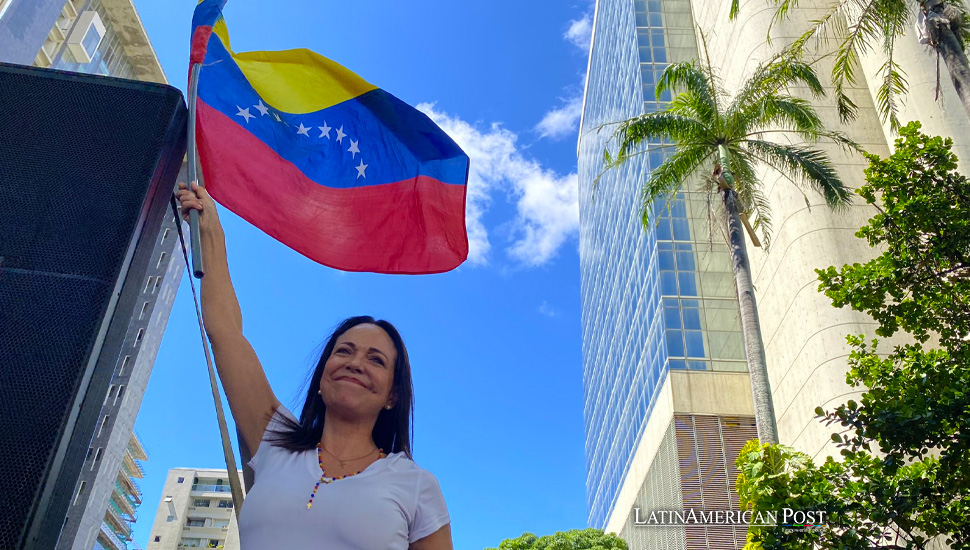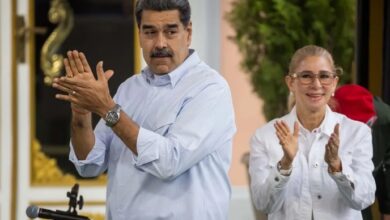Venezuela’s Political Turmoil: OAS Condemns Blocking of Opposition Leader

The Organization of American States (OAS) has strongly criticized the Venezuelan government’s decision to prohibit opposition leader María Corina Machado from running for president, jeopardizing the prospects of a free election in Venezuela.
International Outcry
The Venezuelan government’s decision to bar opposition leader María Corina Machado from presidential candidacy has sparked significant international condemnation, culminating in a strong rebuke from the Organization of American States (OAS). This move, announced last Friday, is seen as a direct threat to the possibility of free and fair elections in Venezuela, a concern that the OAS voiced emphatically in its statement.
Machado, a former lawmaker and a prominent figure in the opposition had emerged as a strong contender in the presidential race after winning a primary held in October by a faction of the opposition supported by the United States. Despite the Venezuelan government announcing a 15-year ban on her candidacy just days after her formal entry into the race in June, Machado secured over 90% of the vote.
Venezuela’s Supreme Tribunal Upholds Ban Despite Prior Agreement
The ban, which alleges fraud and tax violations and accuses Machado of seeking U.S.-imposed economic sanctions against Venezuela, has been upheld by VVenezuela’sSupreme Tribunal of Justice. This decision was made despite an agreement over three months ago between President Nicolás’s government and the U.S.-backed opposition. The agreement aimed to establish primary conditions for fair elections, including inviting international observers and creating an appeals process for banned presidential candidates.
The United States has responded to the court ruling by reviewing its sanctions policy on Venezuela. The Biden administration had previously threatened to reverse some sanctions relief if Maduro’s government failed to lift bans preventing Machado and others from running for office and if it failed to release political prisoners.
Charged Political Climate and Legal Actions in Venezuela
This controversy arises amid a charged political climate in Venezuela. The U.S.-backed opposition, known as the Unitary Platform, surprised allies and adversaries when over 2.4 million people participated in the primary. Subsequently, Venezuela’s Attorney General opened criminal investigations against some organizers and issued arrest warrants for Machado’s campaign staffers. Additionally, a key collaborator of Machado, Roberto Abdul, was detained following the primary and was only released as part of a high-profile prisoner swap between the U.S. and Venezuela.
In its statement, the OAS emphasized the significance of Machado’s leadership, describing it as essential and arising from the convictions and interests of the people. The organization also condemned any attempt to undermine the famous assertion demonstrated in the primaries.
Vandalism, Arrests, and Assassination Accusations
In the past two weeks, the situation in Venezuela has further deteriorated, with opposition party offices being vandalized, campaign staffers arrested, and denied legal counsel. Furthermore, Maduro, along with other government officials, has accused opposition supporters and individuals close to Machado of plotting to assassinate the president and his inner circle, citing alleged confessions and WhatsApp messages as evidence.
Approximately 30 world leaders from Latin America and Spain have condemned the court’s ruling against Machado, signaling widespread international concern over Venezuela’s democratic processes. This latest development is a stark reminder of Venezuela’s complex and often tumultuous political landscape, where the government continues to raise questions about the country’s commitment to democratic principles and human rights.
The Venezuelan government’s decision to block María Corina Machado’s presidential candidacy has significant implications for the country’s political future. It not only undermines the possibility of free and fair elections but also signals a continued erosion of democratic norms in Venezuela. As the international community, including the OAS, voices its concerns, the situation in Venezuela remains precarious, with the future of its democracy hanging in the balance. The unfolding events will be crucial in determining the trajectory of Venezuelan politics and its adherence to democratic values.





